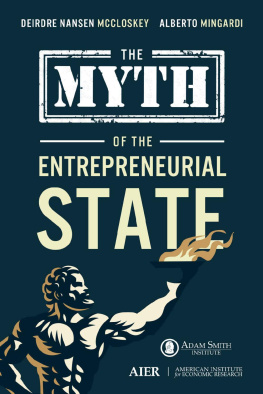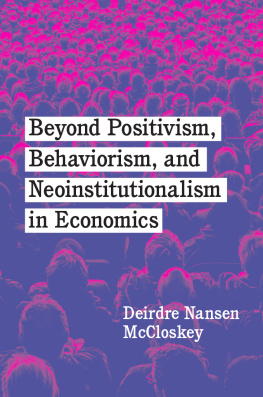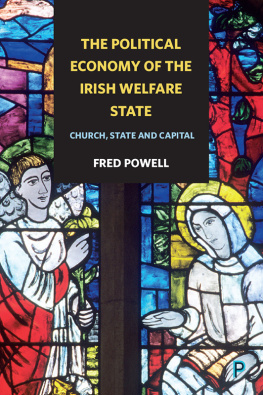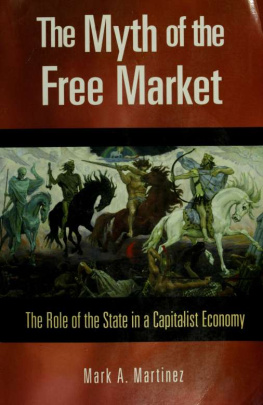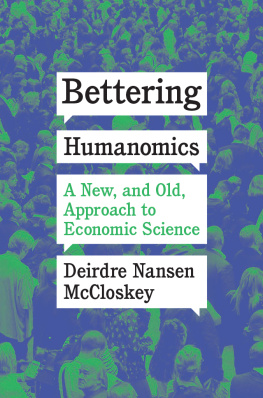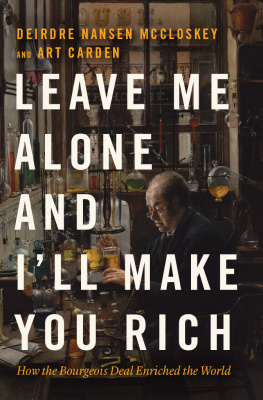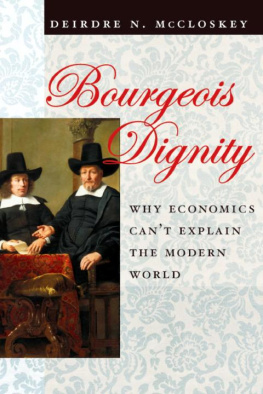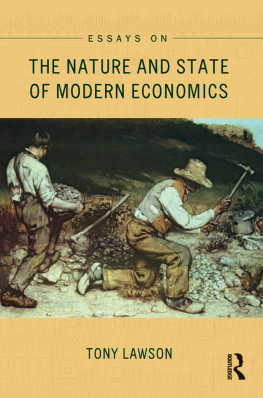
The Myth of the Entrepreneurial State
By Deirdre Nansen McCloskey and Alberto Mingardi
Copyright 2020 by The American Institute for Economic Research, Creative Commons Attribution International 4.0.
ISBN: 9781630692094
Cover art: Vanessa Mendozzi

CONTENTS


T he entrepreneurial state has an economic theory behind it. As the lawyer-president Obama put it, You didnt build that. In other words, outside the office of Google in Mountain View, California the public road, built by the state, is said to be necessary for cars to drive into Googles parking lot. Clearly. Likewise, a literate workforce was built by schools said to be naturally supplied by the state. Obviously. Civil peace is said to depend on state police. Certainly.
And so forth. It is a supply-chain economics. In other words, a piece of infrastructure (a favored word) comes into existence only because of the states investment (another favored word) chosen by the states planning (the most favored word of all). The states piece, such as the road, Obama said, is necessary for private action. Therefore, your private action depends on the state. Stop complaining. Get used to it. Be thankful. Pay your taxes with joy. And accept that your masters spending your taxes are wise and necessary and even, yes, themselves entrepreneurial in their planning. The state is the creative element in the economy.
What then is the practical significance of such an entrepreneurial state? Again, its partisans have a theory, this time political. Any state, of course, likes to make promises it cant keep. Jam today, jam tomorrow. A leading promise is that the state can easily drive (a favorite word) economic development, turning the economys sheering wheel in a good direction. Economic growth can therefore quite easily be driven to be green or just or glorious, according to political tastes. The state will wisely choose winners in the economic race. Of course.
The unsatisfactory alternative is the horrible nonsense from the neo-liberals (another favored word), the crazy claim that a business succeeds or fails depending on what consumers choose to buy or not. Oh, no. Unlike the state, a business works imperfectly (a favored word again, and notably lacking a quantitative standard of imperfection), because consumers and businesspeople are selfish, ignorant, and childishly heedless of the future. The states masters, by contrast, can like Joseph of Egypt foretell the future of seven abundant years followed by seven lean years, and like Joseph are wise and just. Let us do it, laissez nous faireexcept that the us are not the businesspeople of Paris rejecting in 1681 the French Controller-General of Finances Jean-Baptiste Colberts kindly inquiry as to what the state could do to help them, but the Colbertian masters themselves.
Such a statist politico-economic philosophy is of course as ancient as Colberts mercantilism, or Josephs foretelling. Its partisans nowadays mostly reject the label of socialists. Few are calling for a full-fledged nationalization of the means of production, as statists of left and right did with enthusiasm in the 1930s. The argument now is more sweet, along the lines of the social engineering recommended by the British New Liberals of the 1870s and the American Progressives of the 1910s. A product devised and successfully marketed by a private company arises not from the creativity and the risk-taking and even the luck of a single entrepreneur. It arises from steering by the state. You didnt build that. If so, more steering will not crowd out private entrepreneurship, but is its natural complement. Were from the government and were here to help you. What the state does is mostly right and good. Politicians of both left and right, of course, favor such a view. After all, they are the wise and good masters assumed in the theory. And most of the media goes along. If something bad happens, the journalist asks, where was our fatherly master protecting us children? Lets give Daddy more power.
The most fervent recent partisan of statism and the entrepreneurial state is Mariana Mazzucato.
Mariana Mazzucato has been the R.M. Phillips Professor of the Economics of Innovation at the University of Sussex and Professor in University College, London in the Economics of Innovation and Public Value, and in 2020 became an advisor to the Italian government.A contrario. Professors of economics are (almost) all Keynesians now.
She is not therefore a bold rebel against conventional wisdomthe impression a nave reader might acquire from her articles and two popular books, The Entrepreneurial State: Debunking Public vs. Private Sector Myths (2013) and The Value of Everything. Making and Taking in the Global Economy (2018).
Mazzucato, a loyal daughter of the left, is suspicious of private gain, of the sort you pursue when you go shopping, say, and is therefore suspicious of people doing things for a private reward. She wants the State, advised by herself, to decide for you. Yet the private entrepreneur, she would concede, gets a reward if she pleases her customers. And it is in fact what Mazzucato in her own trade has done. She has parachuted herself into the center of the debate about the role of state planning as against private profit-making for innovation and allocation. It is not because she is innovative herself (though that is what her brave rhetoric suggests), but because she is, market-style, giving people what most of them want: magical thinking, mythical certitude, free lunches all around, wise and loving parents guiding the people in a coerced routine from on high. Modern statism. Her theory is the illiberal one that has dominated economics since John Maynard Keynes eight decades ago spoke out loud and bold.
We will be using the word liberal, you see, in its original meaning from the 18th century, and still in most placesnot in its strangely US meaning of democratic socialism, or for that matter not in its strangely Latin American sense of armed authoritarianism. The opposite of liberalism is statism. The economists statist and Keynesian theory was expressed most influentially in the dominant elementary economics textbook of the age, by Paul Samuelson, in all of its numerous editions since 1948. Among millions of other eager students, McCloskey herself was in 1961 taught from Samuelsons book, and became for a while one of the faithful. Mazzucato carries on the Keynesian faith.
The faith is that economists can rescue the sadly unfettered markets by applying fetters forged by brilliant blacksmiths employed by the State, such as Keynes, Samuelson, and Mariana Mazzucato. At the outset, true, you may wonder why fettering the big and little deals that people make, such as buying and selling loaves of bread, would be such a grand idea. But in any case such fettering of market economies by a masterful State, and then driving the economy in one direction or the other, has been the theory of orthodox economists since the 1930s. Mazzucatos version repackages the microeconomic side of Keynes.
She summarizes her case: Mainstream [that is, evil and mistaken, but now sadly dominant] policy conceptions and prescriptions are normative postulations for a permanent state planning [by bad, free-market economists not for real, good, top-down planning but] for more markets, mainly organizing de-regulation cum privatization, rather than deliberate sets of conditional recommendations [by good, pro-State economists] based on pondering [wisely, and with astonishing insight] alternative potentialities and paths. The expert economist, by pondering, is, as the Master put it in 1936, in a position to calculate the marginal efficiency of capital-goods on long views and on the basis of the general social advantage. Pondering, and then intentionally overriding from Whitehall or Washington the prices thrown up by voluntary human action, suffices to drive an economy.
Next page
